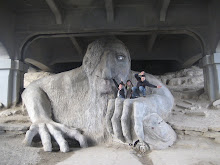RadioShack, friends, that is a miss. A major miss. Perhaps the Shack doesn't have the dough for the electric juices to power every phone in the store. Ok, understandable. But it's frustrating for me, as a consumer and a fan of technology, to see products that I think have huge potential be treated in-store like the same old crap on every other shelf. If you haven't seen the ex-Best Buy employee video about why EVO is better than the 4th generation iPhone, check it out.
If you're going to launch a new product that huge, you have to let people experience it. When you are shopping for a phone it's like you are shopping for an external organ. You are shopping for a critical piece of machinery that connects you to your world. The commercials can list off the devices' capabilities until robots take over the world. What it comes down to is the phsycial interaction for the user and the ease with which they can use those marvelous capabilities.







